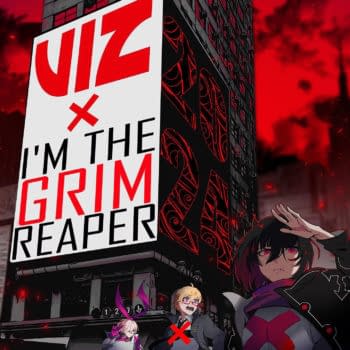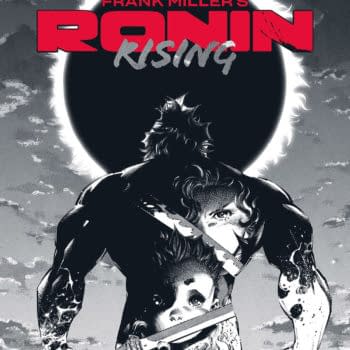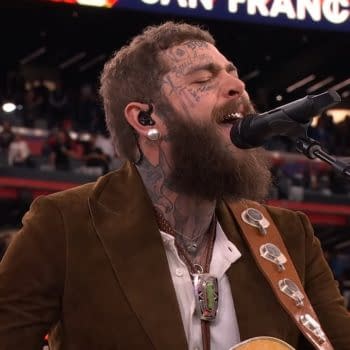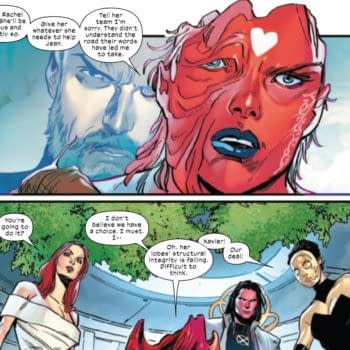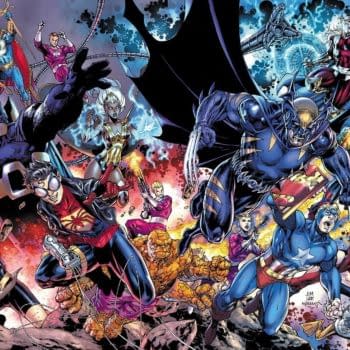Posted in: Comics, Recent Updates | Tagged: Comics, dc comics, dc logo, entertainment, Jeffrey Baldwin, superman, Todd Boyce, Warner Bros
Why DC's Reversal On The Statue Decision Doesn't Solve Their Problem
By Tony Pannacio
"It's not an 's.' On my planet, it stands for 'hope.'"
— Kal-El speaking to Lois Lane, Man of Steel (2013)

That's why it was so important that DC Entertainment relented, reversing their decision to deny the use of the Superman S-Shield in a memorial for a Toronto boy who died as a result of child abuse.
The statue of Jeffrey Baldwin, wearing a Superman T-shirt, can now be used to draw attention to the continuing problem of domestic and child abuse in the U.S. – a problem recognized by the Man of Steel in his very first published story.
But their reversal does not eliminate for DC the long-term problem that caused this most recent issue. Charities have a great interest in using DC's iconic imagery in their campaigns, and it is clear that DC does not have a proper policy that guides them in dealing with those copious requests. They handle them on a one-by-one basis, as indicated by the quote in the Toronto Star story, which means it is possible that the situation that just played out could happen again, and again.
If DC wants to avoid this in the future, they need a plan. Since we at BC are all about being part of the solution and not the problem, I've put together a simple 3-point program that DC could use to solve their public image issue as well as help some very good causes. I doubt they'll use it, but at least they'll have one idea on the table if and when they ever discuss addressing the issue.
1) Issue Statements That Sound Like They Came from Humans – DC Comics has long used their IP in charitable causes, though they have inexplicably denied some worthy charities in the past (for reasons passing understanding). So, if they're denial in this case seemed random and shrill, so did the company's statement announcing their reversal. DC's statement read:
DC Entertainment uses a flexible set of criteria when we receive worthy requests such as this, and at times have reconsidered our initial stance. After verifying the support of appropriate family members, DC Entertainment will be allowing the Jeffrey Baldwin Memorial Statue to feature the Superman 'S' shield.
Wow. You can almost hear the metallic edge, as if the announcement was being made by a Cylon (I know, different fictional universe. Sue me). The Star did not even name the spokesperson, so there isn't even a human voice attached to it. Seriously, DC – WTF? My point is this: You don't get to make billions of dollars telling stories about heroes while your corporate behavior borders on villainy. While DC did the right thing in allowing the usage of the S-Shield, the style in which they did it was as heartless and soulless as the original denial. I would have worded something along these lines:
We want to sincerely apologize to the friends and family of Jeffrey Baldwin as well as artist Todd Boyce who felt that our Superman S-Shield logo would be a perfect accent for the statue of Jeffrey. We are honored that they want to use the shield, and we will happily allow the usage on the statue. The initial legal decision to deny the usage was not correct and does not reflect DC's commitment to helping everyday heroes like Boyce to promote worthy causes and ideas. Domestic and child abuse are not easy issues to discuss, but we must shine a light on the problem so we can properly address it as part of our country's never-ending battle to protect our children.
Yes, apologize. That's what humans do when they screw up. They apologize. After all, corporations are people, now, so shouldn't we hold them to the same standards? Moreover, recognize the issue at hand, which is not your damn S-Shield. The issue at hand is CHILD ABUSE. To make a statement about the use of your IP without mentioning the horrors of domestic violence that caused the conflict is arrogant and heartless. Seriously, it's like Darkseid himself wrote the statement (Okay, back in the DC Universe now. Everybody happy?).
2) Address the Larger Issue – As long as DC is the home of some of the most iconic heroes in the comics, TV and film industry, charities will continue wanting to use those characters to draw attention to their causes. So, why piecemeal it? Create a program for charities so that they can easily apply for proper IP usage from DC. The policies guiding this program can be simple: Each charity must meet basic qualifications:
- Be registered as a 501(c) 3 not for profit corporation, or equivalent status in territories outside the U.S.
- Submit their annual report to demonstrate that at least 90 cents on the dollar of every donation is used for that charity's stated mission, with only 10 cents being used for salaries and administrative costs.
- Sign an agreement that outlines the proper usage of the IP, using correct colors and up-to-date style sheets to be provided by DC (the marketing department has a few gigabytes of files outlining these uses).
- Allow 30 to 60 days to process applicants, knowing that it should not take that long, but wanting to be able to keep the promise to respond in a reasonable timeframe.
3) Create a Landing Page – Design a landing page with its own URL (dcomicscharityportal.com is available for $2.99 per year at GoDaddy) and put the application on that page, along with the complete guidelines of the program.
I've worked with many charities over the years (including The Hero Initiative) and so I must discount any excuses that "Oh, it would cost too much," or "It would take too much time." It took me about 15 minutes to come up with this and another 20 minutes to write it up. If I were to craft the program start to finish, it might take a day or two, tops. Hell, I'll even volunteer to do it if DC wants (granted, it's not like they are going to call, but if they did, I'd do it). The website would take about another couple of days.
In the grand scheme of things, how much time, trouble and effort did the initial denial in the most recent case cost them? And it's not like Comic Con isn't a couple of weeks away, and the folks at DC didn't have anything better to do this week, right? So, instead of waiting for the next shoe to drop – and it will drop, make no mistake – DC should step up and recognize that their IP can do more than just make them billions of dollars. It can also help people who need help.
The bottom line here is that solving the immediate problem does not prevent the same thing from happening again in the future. By creating a program that prevents these issues from burdening them, they could turn the last few days of negatives into years of positives and help a whole lot of people – the kind of people Superman would want to protect – in the process.
Tony Panaccio is a business and marketing consultant and former Senior VP of CrossGen Entertainment, where he managed TV, film and media licensing as well as the company's involvement with The Hero Initiative, a not for profit agency that helps comic creators in need.












